
Rita Hayworth was an American actress. She achieved fame during the 1940s as one of the era's top stars, appearing in 61 films over 37 years. The press coined the term "The Love Goddess" to describe Hayworth after she had become the most glamorous screen idol of the 1940s. She was the top pin-up girl for GIs during World War II.
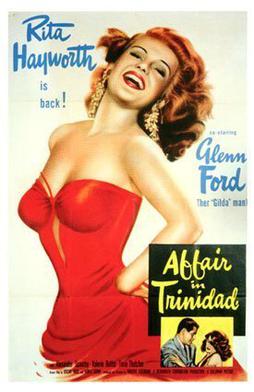
Affair in Trinidad is a 1952 American film noir directed by Vincent Sherman and starring Rita Hayworth and Glenn Ford. It was produced by Hayworth's Beckworth Corporation and released by Columbia Pictures.

Jane Darwell was an American actress of stage, film, and television. With appearances in more than 100 major movies spanning half a century, Darwell is perhaps best remembered for her poignant portrayal of the matriarch and leader of the Joad family in the film adaptation of John Steinbeck's The Grapes of Wrath, for which she received the Academy Award for Best Supporting Actress. She has a star on the Hollywood Walk of Fame.

Solomon Max Wurtzel was an American film producer.

Gilda is a 1946 American film noir directed by Charles Vidor and starring Rita Hayworth and Glenn Ford. The film is known for cinematographer Rudolph Maté's lush photography, costume designer Jean Louis's wardrobe for Hayworth, and choreographer Jack Cole's staging of "Put the Blame on Mame" and "Amado Mio", sung by Anita Ellis. Over the years Gilda has gained cult classic status. In 2013, the film was selected for preservation in the United States National Film Registry by the Library of Congress as being "culturally, historically or aesthetically significant".

Margo was an American actress and dancer. She appeared in many film, stage, and television productions, including Lost Horizon (1937), The Leopard Man (1943), Viva Zapata! (1952), and I'll Cry Tomorrow (1955). She married actor Eddie Albert in 1945 and was later known as Margo Albert.

Eduardo Cansino Reina was a Spanish-born American dancer and actor of Roma/Gitano descent. He was the father of actress Rita Hayworth.

Jane Withers was an American actress and children's radio show host. She became one of the most popular child stars in Hollywood in the 1930s and early 1940s, with her films ranking in the top ten list for box-office gross in 1937 and 1938.
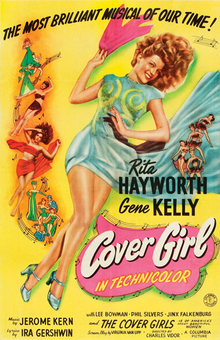
Cover Girl is a 1944 American musical romantic comedy film directed by Charles Vidor, and starring Rita Hayworth and Gene Kelly. The film tells the story of a chorus girl given a chance at stardom when she is offered an opportunity to be a highly paid cover girl. It was one of the most popular musicals of the war years.
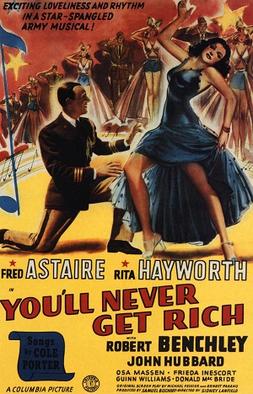
You'll Never Get Rich is a 1941 American musical comedy film with a wartime theme directed by Sidney Lanfield and starring Fred Astaire and Rita Hayworth, with music and lyrics by Cole Porter. The title stems from an old Army song which includes lyrics "You'll never get rich / By digging a ditch / You're in the Army now!"

Jack Cole was an American dancer, choreographer, and theatre director known as "the Father of Theatrical Jazz Dance" for his role in codifying African-American jazz dance styles, as influenced by the dance traditions of other cultures, for Broadway and Hollywood. Asked to describe his style he described it as "urban folk dance".
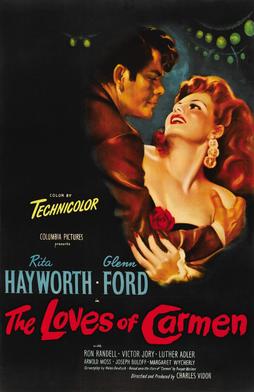
The Loves of Carmen is a 1948 American adventure drama romance film directed by Charles Vidor. The film stars Rita Hayworth as the gypsy Carmen and Glenn Ford as her doomed lover Don José.
Volga Margaret Hayworth was an American dancer and vaudevillian. A popular showgirl on Broadway, she was the mother of actress Rita Hayworth, who used her mother's maiden name as her professional surname.
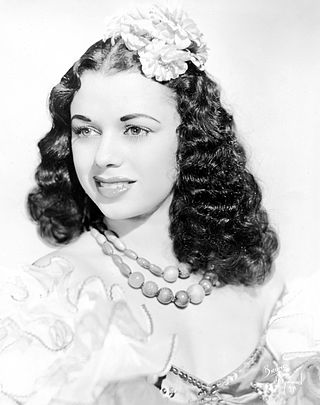
Marquita Rivera, a.k.a. "Queen of Latin Rhythm", was a Puerto Rican actress, singer and dancer.
Margarita is a feminine given name in Latin and Eastern European languages. In Latin it came from the Greek word margaritari (μαργαριτάρι), meaning pearl, which was borrowed from the Persians.

Rita Hayworth: The Love Goddess is a 1983 American made-for-television biographical film directed by James Goldstone. Based on the 1977 biography Rita Hayworth by John Kobal, it deals with real events in the life of actress Rita Hayworth from 1931 to 1952. It was broadcast by CBS on November 2, 1983.

Criminals of the Air is a 1937 American action film, directed by Charles C. Coleman. It stars Rosalind Keith, Charles Quigley and Rita Hayworth. The film marked "Rita Hayworth"'s first onscreen credit; the actress, born Margarita Carmen Cansino, had previously used the stage name "Rita Cansino" or was uncredited in her prior 17 film appearances.

Jane Keckley was an American actress of the silent and sound film eras.

Helen Wood (1917-1988) was an American actress active in film and radio primarily during the 1930s. She is not to be confused with the actress and performer Helen [Ann] Wood (1935-1998), who later appeared in Deep Throat and other adult films as "Dolly Sharp".
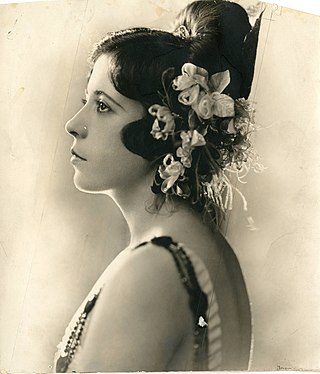
Elisa Cansino (b.1895) was a vaudeville and Spanish dancer, and one of The Dancing Cansinos. She was the daughter of Antonio Cansino and aunt of Rita Hayworth. Elisa played a major part in bringing Spanish and Romani dances to the United States. Elisa Cansino is of Romani descent through her father's line.




















